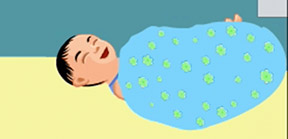A baby’s breathing pattern is also not consistently rhythmic. Newborns take lots of rapid, shallow breaths and other times they may take longer and slower breaths followed by shallower ones. Then they may pause for a couple of seconds and not take a breath at all. When you observe the baby and when it doesn't seem to be breathing for a few seconds it can be scary, but this is normal and is called “periodic breathing”. This is seen in majority of healthy, well babies. With time and increasing maturity most babies outgrow this pattern of breathing.
In some cases, noisy breathing could be caused by the sound of the air flowing over the saliva which pools at the back of the baby’s throat. Unlike adults, babies are not able to clear their throat, or cough when they want to, this can lead to the build up of saliva and some mucus.
Apart from it, newborn’s nose is small, thier nasal passages are narrow and thus passing of air through these passages can sometimes produce some noise. The noise may seem abnormal but as long as they are thriving, healthy and reaching their milestones on time there is nothing much to worry.
If the secretions solidify then, sometimes it is helpful to use normal saline nose drops. These drops can liquefy the nasal secretions and help to clear mucous which may be obstructing the baby’s nostrils. However, before doing this, check with your baby’s doctor and make sure there is no other medical cause for the noisy breathing. The noises produced by babies when they are sleeping may seem abnormal, for you as an onlooker, but as long as they are thriving, healthy and reaching their milestones on time there is nothing much to worry.
Signs to watch out for -
- If your baby is coughing or wheezing.
- If your baby has an elevated temperature.
- If your baby has signs of a “cold” or other signs of illness.
- If you see the area above or below your baby’s rib cage being “sucked in” as they breathe. - This could be due to increased difficulty in breathing and they are using other muscles to breath.
At the end of the day, you know your baby well than anybody else, if you feel something is not right and you are worried, see the doctor immediately

